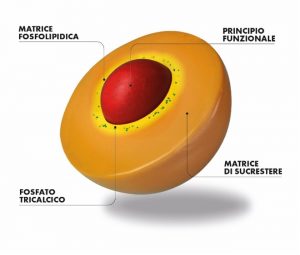20 February 2023 | News, Science
Iron and intestinal microbiota

Iron (Fe) is a mineral that our bodies need for many functions, first of all for its pivotal contribution in the formation of new red blood cells and in the formation of hemoglobin, protein responsible for transporting oxygen to all organs and tissues of our body. In addition to this important function, iron is also considered essential in contributing to the normal function of the immune system.
In medical practice iron is widely used to recover all those states of iron deficiency (sideropenia) or, in severe cases, of iron deficiency anemia, where hemoglobin levels (Hb) are below the physiological ranges established by the World Health Organization (Hb<13 g/dL in men, Hb<12 g/dL in women, Hb<10.5 g/dL in children).
Sideropenia is the largest nutritional deficiency in the world population and, to face up this reduced presence of iron in the body, the administration of oral iron supplements or drugs are commonly used.
Most of these iron products, however, widely cause adverse gastrointestinal effects, such as nausea, abdominal pain, diarrhea, and cause adverse changes to the intestinal flora.
Intestinal Flora
Intestinal flora means the set of bacteria present in the human intestine and the correct scientific term to describe this set is intestinal microbiota.

Human microbiota is composed of over one thousand billion bacteria, viruses, fungi and protozoa, with a total weight of about 1,5 kg, which act as if they were a single organism and perform important functions for human health. The totality of the concentrated microorganisms mainly in the intestine have multiple functions, including:
- Barrier function, in fact, the presence of the microbiota protects the host from the colonization of potentially pathogenic bacteria;
- Metabolic function, thanks to the degradation of the main macromolecules deriving from the diet;
- Function on the immune system, as the microbiota can affect both the development and activity, modulating the responses of the epithelial tissue and systemic responses;
Therefore, all microorganisms belonging to the intestinal flora are to be considered excellent allies for the proper functioning of our organism.
Iron and the intestinal microbiota
Iron has a paradoxical effect for human health: on the one hand it is necessary and fundamental for the formation of hemoglobin, for the transport of oxygen and as a catalyst for the proper proliferation of cells of our immune system, on the other hand high levels of this mineral can cause oxidative effects, therefore toxic to our cells, generating a chain reaction of inflammatory processes that aggravate the health of the subjects.
In addition, iron that is taken orally, adversely affects the intestinal microbiota due to its high permanence within the intestinal lumen, leading to an increase in pathogenic microorganisms that use iron as a source for replication, thus resulting in a decrease in the “good” microorganisms of the intestinal flora.
Many studies have shown that the intestinal microbiota is closely related to the functioning of the Immune System and Central Nervous System, commonly called Gut-Brain Axis (GBA).
GBA is a direct, bidirectional line of communication between the two systems, connecting centers of the cognitive and emotional sphere, endocrine, immunological, and humoral.
The influence of intestinal microbiota on GBA is manifested by multiple mechanisms: one of these involves bacterial metabolites (such as lipopolysaccharides and short-chain fatty acids, including butyric acid), which have active properties on the nervous system; another mechanism is based on the use of the same neurotransmitters, such as acetylcholine, serotonin and dopamine, with direct modulation effect of their production and secretion throughout the body.
Given the important function of the intestinal microbiota and the negative effects of supplements based on conventional iron salts on it, Pharmanutra S.p.A. has formulated an innovative formulation, which is called Sucrosomial® technology, in which the iron pyrophosphate is protected by a matrix of phospholipids and sucrose esters of fatty acids. All of these elements take part in a single structure, called Sucrosoma® (Figure).

Sucrosomial® Iron, marketed under the name of Sideral®, has a different absorption profile than common iron products, avoiding the mineral to come into contact with the gastrointestinal mucosa and, therefore, not to adversely affect the intestinal microbiota.
Given its structure similar to that of chylomicrons, intestinal lipoproteins that carry in circulation substances of a lipophilic nature, it could be assumed that once absorbed in the intestine, reaches the liver, where the phospholipid matrix is degraded thanks to the action of lysosomal enzymes, and make iron pyrophosphate available for binding to transferrin, protein able to convey iron in the body and transport it to the sites for its use, mainly at the bone marrow level for the formation of new red blood cells.
In a preclinical study conducted on animal models, two groups of mice were compared; the first was given Sideral®, while the second was given iron sulphate. The aim of the study was to assess the possible adverse effect on intestinal flora.
The results showed that the Sideral®, compared to the common Iron Sulfate, is able to avoid the common side effects related to the administration of conventional oral iron, as well as reducing the growth of some pathogenic microorganisms for our body (for example Escherichia coli and Salmonella) and to preserve the good state of the intestinal microbiota.
In conclusion, the use of Sideral® has proven to be safe and effective in all iron-deficient subjects, even in all those conditions in which its absorption is compromised.

Bibliography:
- https://www.who.int/health-topics/anaemia#tab=tab_1
- Buffie CG, et al.; Microbiota-mediated colonization resistance against intestinal pathogens. Nat Rev Immunol 2013;13:790- 801.
- Plaza-Diaz J, et al.; Modulation of immunity and inflammatory gene expression in the gut, in inflammatory diseases of the gut and in the liver by probiotics. World J Gastroenterol 2014;20:15632-49.
- Zakrzewski M. et al.; Supplementation with Sucrosomial iron leads to favourable changes in the intestinal microbiome when compared to ferrous sulfate in mice. Biometals. 2022 Feb;35(1):27-38.
- Gómez-Ramírez S., et al.; Sucrosomial® Iron: A New Generation Iron for Improving Oral Supplementation. Pharmaceuticals (Basel). 2018 Oct 4;11(4):97.
- Giordano G., et al.; Effects of Different Iron Formulation Support on selection of some Pathogens in Human Gut Flora: Monocentric Study. 7th IMCID 2019, Rome, Italy.
- https://www.sideral.it/
